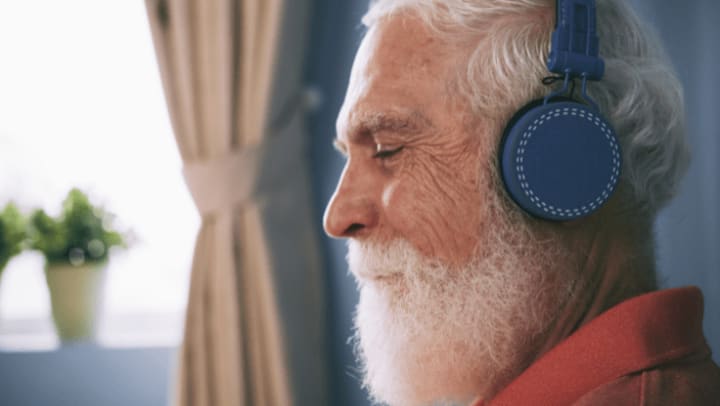Music creates powerful connections to our memories. A childhood lullaby or a wedding song can instantly transport us back to precious moments in time. By understanding the science behind music and memory, people looking for senior living with dementia care in Park Cities can find hope and practical therapy options.
Research demonstrates that people with Alzheimer's and other forms of dementia do best in small, specialized care settings. These environments allow care teams to customize therapeutic approaches like music to each resident's unique needs. This piece shows how music and other sound-based experiences can boost memory care effectively.
The Science Behind Music and Memory
Music triggers activity in multiple brain regions simultaneously. When familiar melodies play, the salience network—an area that resists Alzheimer's disease—becomes active. This network processes emotional significance and stays functional even as other cognitive abilities decline.
Music helps different regions of the brain communicate with each other. Studies show that listening to meaningful music boosts the connection between visual, salience, executive and cerebellar networks. This whole-brain activation explains why people with language trouble can still sing lyrics perfectly.
The brain's reward system releases dopamine when music creates emotional responses. This neurotransmitter might help reduce age-related cognitive decline. You can improve your loved one's experience with memory care through these thoughtful sound experiences:
-
Familiar melodies from their youth
-
Calming nature sounds like rainfall or birdsong
-
Meaningful voice recordings from family members
-
Everyday sounds that trigger positive memories
Research findings on music therapy for dementia
Music therapy can't reverse cognitive decline but helps maximize brain function. Research shows active participation (singing, playing instruments) and passive listening help, as well as individual playlists, work incredibly well. Clinical studies show several benefits of music therapy:
-
It makes verbal and language fluency better
-
Eases behavioral and psychological symptoms, including anxiety, depression and agitation
-
Boosts autobiographical memory recall
-
It reduces apathy and helps people socialize more
Types of Musical Interventions for Memory Care
Medical professionals now acknowledge several proven approaches that adapt to your cognitive abilities and specific needs.
-
Personalized playlists and their benefits: A person's unique history shapes custom music selections that yield excellent results. Research shows your playlist should focus on songs from ages 10-30—called the "memory bump" period—because these songs create the strongest emotional connections. Studies also show that individual-specific music interventions:
-
Reduce the need for anti-anxiety medications
-
Decrease feelings of being overwhelmed for both residents and caregivers
-
Improve interpersonal behaviors between residents and family members
-
-
Group music sessions: Shared musical experiences deliver social benefits that solo listening can't match. Group singing boosts social skills and creates awareness of others naturally. Participants build meaningful connections through musical communication even when verbal abilities decline. Family members can join these sessions and deepen their bonds through shared musical moments.
-
Instrument playing and rhythmic activities: Drumming circles, percussion instruments and simple body movements provide unique therapeutic benefits. Rhythmic activities help organize time and space and improve gross and fine motor coordination if you have dementia. People with advanced dementia can still participate because rhythmic activities create meaningful sounds when communication skills fade.
Beyond Music: The Full Spectrum of Auditory Stimulation
Sound affects our lives in countless ways beyond music. Families with loved ones in senior living communities can learn about the full range of sound therapy. These therapeutic pathways create better connections and comfort.
Nature sounds and their calming effects
Brain function and emotional well-being respond strongly to leaves rustling or rainfall patterns. Research shows nature sounds can:
-
Lower stress hormones and reduce negative emotions
-
Create positive moods and boost cognitive performance
-
Support the body's natural healing balance
Water sounds have the strongest effect on health outcomes, followed by bird sounds for stress relief. Scientists discovered that nature sounds can alter brain connections. These sounds help reduce the fight-or-flight response that often manifests as anxiety in dementia patients.
Familiar household sounds as memory triggers
Simple everyday sounds work as powerful memory anchors. Keys jingling, bacon sizzling or a coffee grinder can spark memories. These sound experiences stay available even as other cognitive abilities decline.
The right timing of sounds makes a big difference. Morning hours work best with engaging sounds like birds or kitchen activities. Evening hours benefit from calming sounds like gentle rain or crackling fire. These familiar sounds help dementia patients connect with their surroundings. They get a better sense of place and time.
Voice recordings from loved ones
A family member's voice provides exceptional comfort. Special recording devices for dementia patients let caregivers save reassuring messages to play when needed. These tailored audio connections fight isolation while giving practical updates ("Today is Tuesday, you've had breakfast...").
Melodies of Hope
Music is an amazing tool in dementia care. It gives families a meaningful way to connect with their loved ones when other forms of communication become challenging. Flexible yet organized methods help families incorporate meaningful music experiences into daily care at home or in specialized places like Iris Memory Care of Turtle Creek.
Professional guidance makes a big difference - ask memory care experts at (214) 559-0140 about how specialized auditory programs could benefit your loved one.



